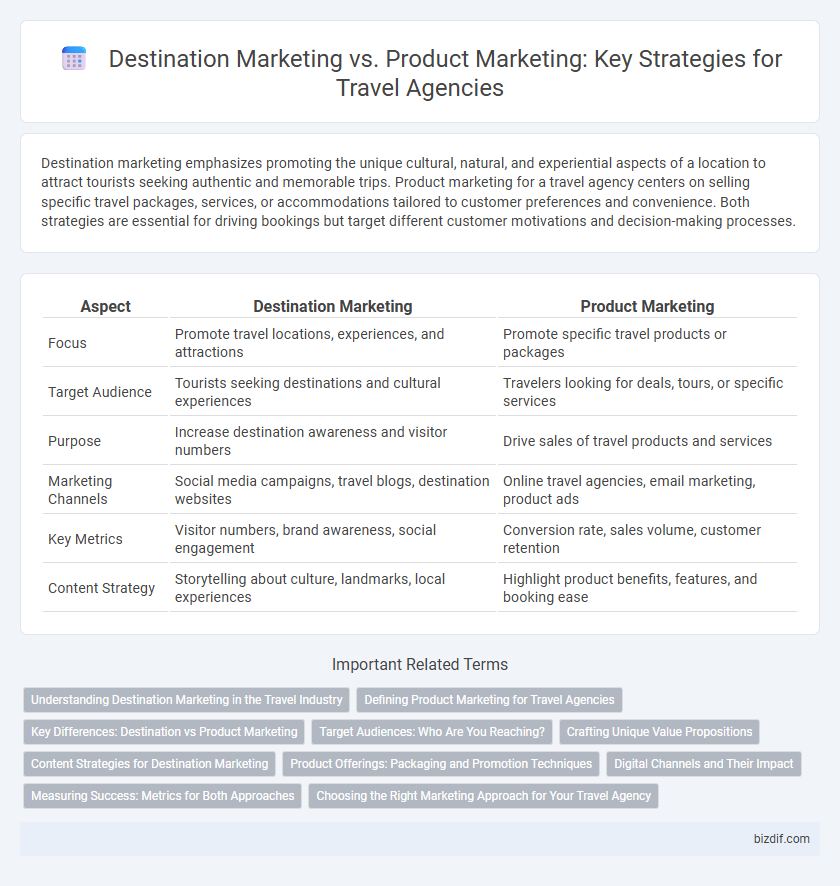Destination marketing emphasizes promoting the unique cultural, natural, and experiential aspects of a location to attract tourists seeking authentic and memorable trips. Product marketing for a travel agency centers on selling specific travel packages, services, or accommodations tailored to customer preferences and convenience. Both strategies are essential for driving bookings but target different customer motivations and decision-making processes.
Table of Comparison
| Aspect | Destination Marketing | Product Marketing |
|---|---|---|
| Focus | Promote travel locations, experiences, and attractions | Promote specific travel products or packages |
| Target Audience | Tourists seeking destinations and cultural experiences | Travelers looking for deals, tours, or specific services |
| Purpose | Increase destination awareness and visitor numbers | Drive sales of travel products and services |
| Marketing Channels | Social media campaigns, travel blogs, destination websites | Online travel agencies, email marketing, product ads |
| Key Metrics | Visitor numbers, brand awareness, social engagement | Conversion rate, sales volume, customer retention |
| Content Strategy | Storytelling about culture, landmarks, local experiences | Highlight product benefits, features, and booking ease |
Understanding Destination Marketing in the Travel Industry
Destination marketing in the travel industry emphasizes promoting the unique cultural, historical, and natural attractions of specific locations to attract visitors, highlighting experiences rather than just commodities. It involves strategic collaboration with local stakeholders, including governments and businesses, to create a compelling narrative that differentiates the destination from competitors. By focusing on authentic storytelling and immersive experiences, destination marketing drives tourism growth and boosts the economic impact on the region.
Defining Product Marketing for Travel Agencies
Product marketing for travel agencies centers on promoting specific travel experiences such as tours, accommodations, and transportation packages tailored to target customer segments. Emphasizing features, benefits, and unique selling points of travel products helps agencies differentiate offerings in competitive markets. Effective product marketing drives bookings by aligning travel products with travelers' preferences, ensuring clarity in communication and value proposition.
Key Differences: Destination vs Product Marketing
Destination marketing emphasizes promoting the unique cultural, historical, and natural attractions of a specific location to attract tourists by creating an emotional connection and highlighting experiences. Product marketing focuses on the features, benefits, and competitive advantages of specific travel packages, tours, or services offered to consumers. Key differences include destination marketing's broad appeal to a geographic area versus product marketing's targeted approach to selling specific travel products or services.
Target Audiences: Who Are You Reaching?
Destination marketing targets a broad audience interested in exploring new places, including leisure travelers, adventure seekers, and cultural enthusiasts who prioritize experiences and local attractions. Product marketing focuses on specific travel offerings such as tours, accommodations, or transport services designed to meet the needs of niche segments like luxury travelers, family vacationers, or business clients. Understanding the distinct preferences and behaviors of these target audiences enables travel agencies to tailor campaigns that maximize engagement and conversion rates.
Crafting Unique Value Propositions
Destination marketing emphasizes showcasing a location's unique cultural, historical, and natural attractions to create an emotional connection with travelers, while product marketing focuses on specific travel packages, tours, or experiences offered by an agency. Crafting unique value propositions in destination marketing involves highlighting exclusive regional features, such as UNESCO World Heritage sites or local festivals, to differentiate the destination from competitors. In product marketing, value propositions are crafted by emphasizing exclusive itineraries, personalized services, or limited-time offers that cater to niche traveler preferences.
Content Strategies for Destination Marketing
Destination marketing prioritizes immersive storytelling and local experiences to attract travelers, leveraging rich content such as cultural insights, landmarks, and event information to create emotional connections. Product marketing focuses on selling specific travel packages or tours by highlighting features, pricing, and convenience. Effective content strategies for destination marketing include user-generated content, virtual tours, and interactive maps to enhance engagement and authenticity.
Product Offerings: Packaging and Promotion Techniques
Destination marketing emphasizes showcasing unique attractions and experiences of a location, while product marketing focuses on crafting comprehensive travel packages that bundle accommodations, tours, and services. Effective product offerings often include tailored packaging to meet specific traveler needs, utilizing promotional techniques such as personalized deals, seasonal discounts, and bundled pricing to enhance appeal. Leveraging digital platforms and targeted advertising campaigns maximizes reach and drives customer engagement in competitive travel markets.
Digital Channels and Their Impact
Digital channels transform destination marketing by leveraging immersive content and geo-targeted campaigns, enhancing traveler engagement through social media platforms and virtual tours. Product marketing in travel agencies concentrates on promoting specific packages and deals, using personalized email campaigns and retargeting ads to drive conversions. The impact of these digital strategies increases brand visibility, optimizes customer acquisition costs, and boosts overall booking rates.
Measuring Success: Metrics for Both Approaches
Destination marketing success is measured through metrics like visitor numbers, average length of stay, and economic impact on local businesses, highlighting overall regional appeal. Product marketing effectiveness focuses on sales volume, customer satisfaction ratings, and repeat purchase rates, emphasizing individual travel packages. Both approaches use digital engagement metrics such as website traffic, click-through rates, and social media interactions to gauge campaign performance.
Choosing the Right Marketing Approach for Your Travel Agency
Destination marketing emphasizes promoting the unique appeal and experiences of a specific location, attracting travelers by highlighting local culture, attractions, and events. Product marketing focuses on selling specific travel packages, tours, or services tailored to customer preferences and needs. Travel agencies should evaluate their target audience, competitive landscape, and business goals to determine whether a destination-centric or product-centric marketing strategy best drives bookings and brand loyalty.
Destination marketing vs Product marketing Infographic

 bizdif.com
bizdif.com